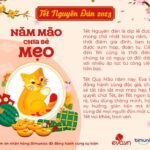Setting up an altar for the Earth God is a beautiful tradition that holds spiritual significance and is believed to bring luck and fortune to the family. It is important to approach this practice with reverence and ensure that the altar is prepared with care and attention to detail.
1 Understanding the Earth God and the Significance of Worship
The Earth God, often referred to as the “God of Land,” is a revered deity in folk beliefs. He is believed to govern both the land and the sky, acting as a guardian deity who bestows blessings of good luck and abundance upon humans. This belief has led to a tradition of worship, with people offering prayers and devotion to the Earth God throughout the year, especially during festivals and holidays when the altar is adorned with extra care.
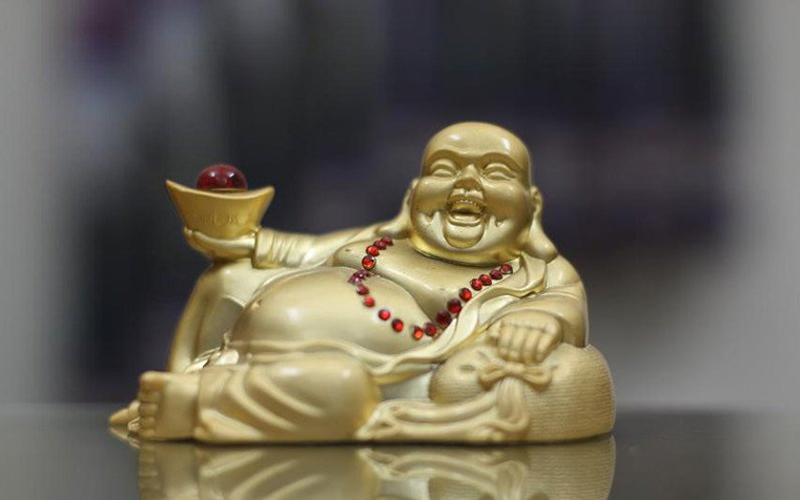
Worship is a way for people to express their deepest prayers, wishes, and devotion to the gods and deities. When worshipping the Earth God, people often wish for abundant harvests, prosperity, and a life of comfort. It is a spiritual practice that strengthens the connection between humans and the divine, seeking blessings and guidance for a fruitful and fortunate life.
Note: The placement of the altar is said to influence the flow of luck and fortune, so it is important to position it in the right location.
2 Choosing the Right Size for the Earth God Altar with the Lu Ban Ruler
Understanding the 39 Lu Ban Ruler
The 39 Lu Ban ruler is a specialized tool used in Feng Shui practices. It measures 38.8cm in length, with a unique cycle of 10 compartments that repeat every 39cm. Each compartment holds a specific meaning and significance, influencing the energy and fortune of the space it measures. The compartments, from left to right, are: Dinh, Hai, Vuong, Kho, Nghia, Quan, Tu, Hung, That, and Tai.
This ruler is specifically designed for measuring Yin Trachs, which include graves, altars, and ancestral altars. It is important to use the correct type of Lu Ban ruler, as there are variations based on size, and the 39 Lu Ban ruler is the one specifically intended for measuring altars.
 39 Lu Ban Ruler – A Specialized Tool for Measuring Altars
39 Lu Ban Ruler – A Specialized Tool for Measuring Altars
The Meaning of Each Compartment on the 39 Lu Ban Ruler
Dinh Compartment (?): Represents Sons and brings positive influences, including:
- Phuc Tinh (??): The lucky star that bestows good fortune and universal blessings.
- Cap Dei: Symbolizes success in academic pursuits and passing examinations.
- Tai Vuong: Indicates the arrival of wealth, bringing financial prosperity.
- Dang Khoa: Signifies passing an important examination, leading to new opportunities.
Hai Compartment: Carries more negative influences, including:
- Khau Thiet: Represents suffering caused by one’s words, highlighting the power of speech.
- Lam Benh: Indicates falling ill, a reminder of the fragility of health.
- Tu Tuyet: Signifies the loss of descendants, a somber reminder of life’s impermanence.
- Hoa Chi (Tai Chi): Warns of sudden misfortune or unexpected disasters.
Vuong Compartment: Brings a mix of positive influences, including:
- Thien Duc: Signifies divine virtue and spiritual blessings, a connection to the divine.
- Hy Su: Indicates the arrival of joyful news or events, bringing happiness.
- Tien Bao: Represents the arrival of wealth, a sign of financial abundance.
- Them Phuc (Nap Phuc): Abundance of blessings and good fortune, a life filled with positivity.
Kho Compartment: Contains negative influences that one should be aware of:
- That Thoat: Signifies the loss of possessions or wealth, a reminder of life’s unpredictability.
- Quan Quy: Indicates legal disputes or conflicts, a warning to stay vigilant.
- Kiep Tai: Represents being robbed or losing possessions, a sign of misfortune.
- Vo Tu: Indicates a lack of descendants to carry on the family lineage, a somber reminder.
Nghia Compartment: Brings positive influences and blessings:
- Dai Cat: Signifies a great blessing or good fortune, a true blessing from the divine.
- Tai Vuong: Abundance of wealth, a sign of financial prosperity and stability.
- Loi Ich (Ich Loi): Indicates gaining benefits or profits, a fortunate turn of events.
- Thien Kho: Signifies a heavenly treasure or a windfall, an unexpected blessing.
Quan Compartment: A mix of positive influences that bring fortune and honor:
- Phu Quy: Represents wealth and honor, a sign of prosperity and respect.
- Tien Bao: Indicates receiving precious gifts or treasures, a symbol of abundance.
- Tai Loc (Hoach Tai): Abundance of wealth, a sign of financial prosperity.
- Thuan Khoa: Symbolizes success in examinations, a sign of academic achievement.
Tu Compartment: Contains a mix of influences, including:
- Ly Huong: Leaving one’s homeland or going abroad, a significant life change.
- Tu Biet: Losing a loved one or experiencing a death in the family, a somber event.
- Thoat Dinh: Signifies the loss of a son, a heart-wrenching occurrence.
- That Tai: Indicates loss of wealth, a financial setback.
Hung Compartment: Brings positive influences and prosperity:
- Dang Khoa (Dong Khoa): Symbolizes success in academic pursuits and examinations.
- Quy Tu: Represents a well-behaved and obedient son, a blessing for parents.
- Them Dinh: Having more sons, a sign of a growing family.
- Hung Vuong: Prosperity and abundance in all endeavors, a fortunate blessing.
That Compartment: Contains more negative influences that one should be mindful of:
- Co Qua: Loneliness or being alone, a somber state of being.
- Lao Chap: Imprisonment or being held captive, a restrictive state.
- Cong Su: Involvement with government or authorities, a potentially challenging situation.
- Thoat Tai: Indicates loss of wealth, a financial setback.
Tai Compartment: Brings positive influences and good fortune:
- Nghinh Phuc: Arrival of blessings and good fortune, a welcome occurrence.
- Luc Hop: All six directions are auspicious and favorable, a sign of harmony.
- Tien Bao: Arrival of wealth, a sign of financial abundance.
- Tai Duc: Possessing both wealth and virtue, a fortunate and honorable state.
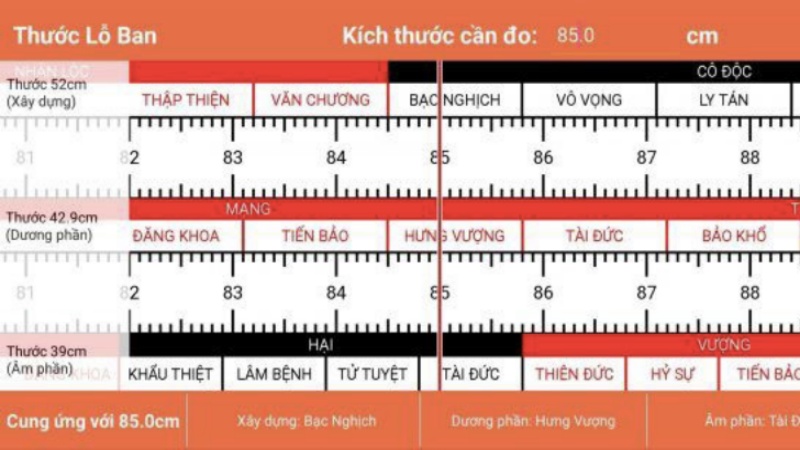 Compartments on the 39 Lu Ban Ruler and Their Meanings
Compartments on the 39 Lu Ban Ruler and Their Meanings
Selecting the Size of the Earth God Altar with the Lu Ban Ruler
Determining the size of the Earth God altar is a precise process that requires careful consideration. It is essential to use the correct ruler, which is the 38.8 Lu Ban ruler designed specifically for measuring Feng Shui elements like altars. This ruler, along with the 38.8 Lu Ban ruler measurement table for altars, will guide you in choosing the most auspicious dimensions.
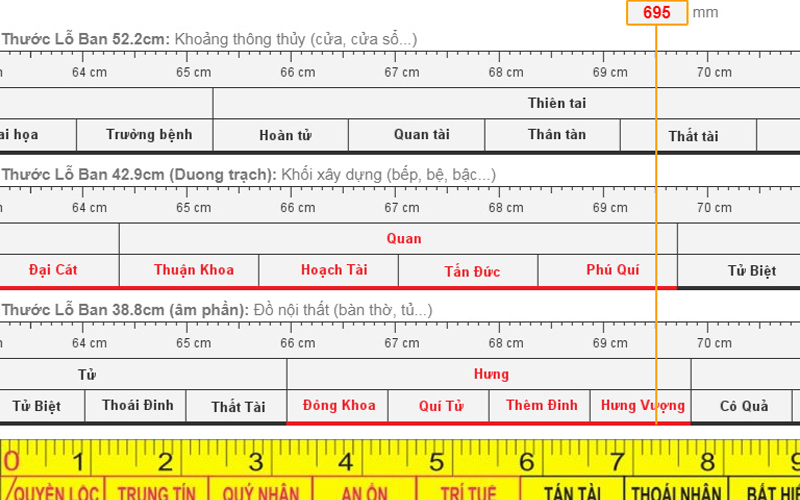
The ruler features various compartments, each holding a specific meaning. Auspicious compartments include Tai Vuong (Wealth and Prosperity), Dai Cat (Great Blessing), and Hung Vuong (Prosperity). Measurements falling within the red compartments of Dinh, Vuong, Nghia, Quan, Hung, or Tai are considered fortunate, while the black and gray compartments should be avoided.
Here are some recommended sizes for the Earth God altar that are considered auspicious:
Size: 48 x 48 x 68 cm – A Compact and Auspicious Option
This size is ideal for those seeking a space-saving altar without compromising on auspicious dimensions. The number 48 falls within the Vuong compartment, associated with Hy Su, indicating joyful events and celebrations. Meanwhile, the number 68 falls within the Hung compartment, symbolizing the arrival of a beloved son, a true blessing for any family.
This size not only brings good luck but also offers a sleek and compact design, making it perfect for smaller spaces.
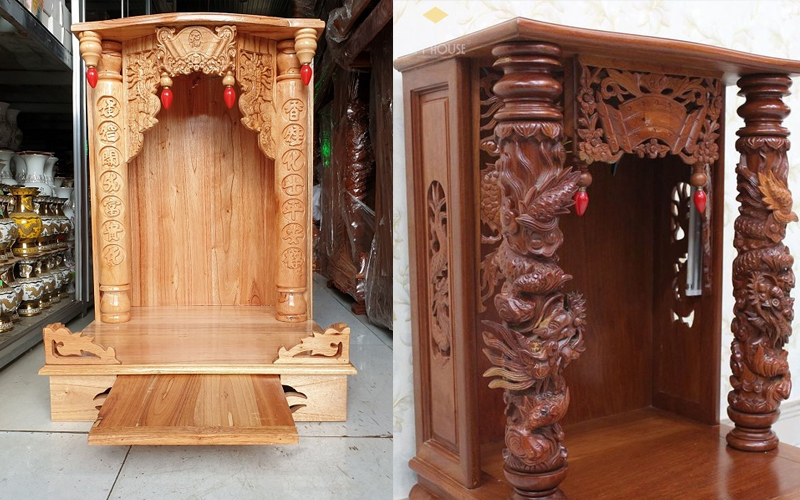
Size: 61 x 61 x 88 cm – A Balanced and Harmonious Choice
This medium-sized altar strikes a perfect balance, neither too large nor too small. If you are unsure about the size, this option provides a sense of proportion and harmony.
The number 61 falls within the Quan compartment, associated with Hoanh Tai, indicating unexpected wealth or treasures beyond one’s imagination. On the other hand, the number 81 falls within the Vuong compartment and is linked to Tien Bao, symbolizing an abundance of wealth that continues to grow and flourish.
Size: 68 x 68 x 108 cm – A Popular Choice for Auspicious Measurements
This size is slightly larger but remains a popular choice due to its fortunate dimensions. The number 68 falls within the Hung compartment, indicating the arrival of a son, a joyous event for any family. Meanwhile, the number 108 also falls within the Hung compartment and is associated with Hung Vuong, symbolizing prosperity and success in all endeavors.
Size: 81 x 81 x 108 cm – A Grand and Luxurious Option
For those with spacious homes and a taste for the grand, this size is believed to bring an abundance of luck and fortune. The larger dimensions create a sense of grandeur and opulence, making it a perfect choice for luxurious interiors.
The number 81 falls within the Dinh compartment and is associated with Dang Khoa, indicating academic success and good fortune in examinations. This size is ideal for those seeking a statement piece for their spiritual practice.
In addition to these sizes, there are other measurements that fall within the auspicious compartments of the Lu Ban ruler. Feel free to explore these options and choose the size that resonates with your personal preferences and Feng Shui recommendations.
3 Choosing the Altar Size Based on Your Age
When selecting the size of the Earth God altar based on your age, it is advisable to consult a Feng Shui master or expert. They will be able to guide you in choosing the most suitable size according to your birth year and other personal factors. With their guidance, you can then proceed with the custom fabrication of the altar to ensure it aligns with your unique needs.

However, it is worth noting that some people believe that the size of the Earth God altar is not solely dependent on the age of the homeowner. Instead, they suggest using the Lu Ban ruler as the primary tool to determine the most auspicious measurements, regardless of age.
Important Considerations When Placing the Earth God Altar

Place the altar in a dry and clean area of your home, preferably in a corner, leaning against a wall. It should face the main entrance of your house, welcoming positive energy and blessings.
Choose the direction of the altar based on the homeowner’s age and life path. If this information is not available, the southwest direction is generally considered favorable. However, it is always best to seek personalized advice from a Feng Shui expert.
Regularly light incense, offer prayers, and maintain the cleanliness of the altar to show your devotion and respect.
With these suggestions for auspicious

























